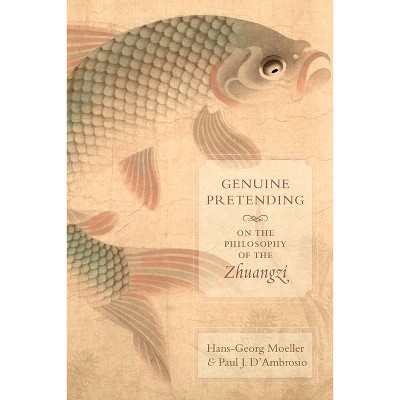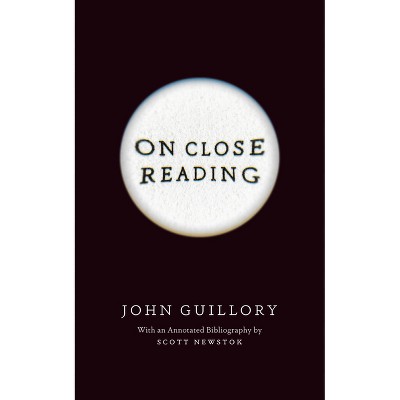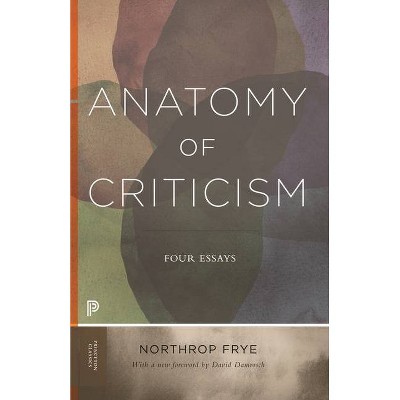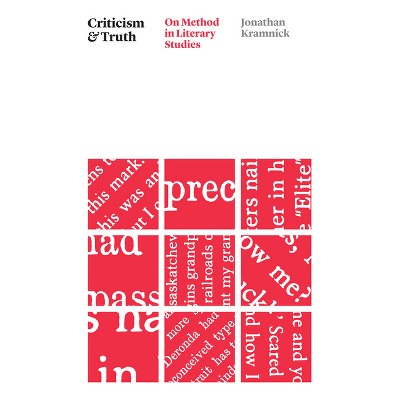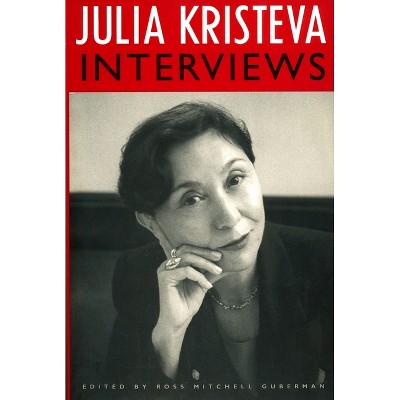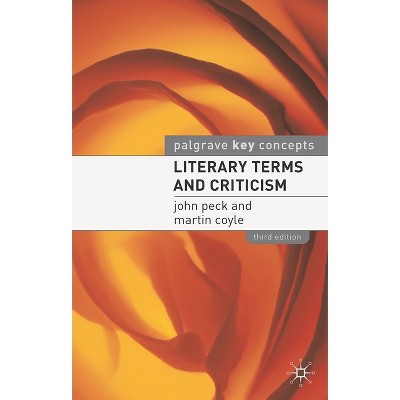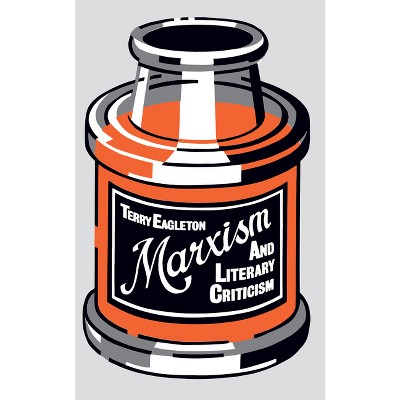Sponsored

Professing Criticism - by John Guillory (Paperback)
$27.49Save $1.51 (5% off)
In Stock
Eligible for registries and wish lists
Sponsored
About this item
Highlights
- A sociological history of literary study--both as a discipline and as a profession.
- About the Author: John Guillory is the Julius Silver Professor of English at New York University.
- 464 Pages
- Literary Criticism, Semiotics & Theory
Description
About the Book
"As the humanities in higher education struggle with a jobs crisis and declining enrollments, the travails of "English" have been especially acute and long-standing. No scholar has analyzed the discipline's contradictions as authoritatively as John Guillory, whose 1993 book Cultural Capital: The Problem of Literary Canon Formation remains a classic and whose subsequent essays on the profession of literary study have been widely cited. In this much-anticipated new book, Guillory shows how literary study has been organized, both historically and in the modern era, both before and after its professionalization. The traces of this volatile history, he shows, have solidified into permanent features of the university. Yet the discipline continues to be troubled by the relation between discipline and profession, both in its ambivalence about the literary object and in its anxious embrace of a professionalism that betrays the discipline's relation to its amateur precursor: criticism. In a series of essays, several previously unpublished, Guillory unpacks what it means to "profess criticism." His book gives a timely and incisive explanation for the perennial churn in literary study, the constant revolutionizing of its methods and objects, and the permanent crisis of its professional identification. It closes with a robust outline of five key rationales for literary study, offering a credible account of the aims of the discipline and a reminder to the professoriate of what they already do, and often do well"--Book Synopsis
A sociological history of literary study--both as a discipline and as a profession. As the humanities in higher education struggle with a labor crisis and with declining enrollments, the travails of literary study are especially profound. No scholar has analyzed the discipline's contradictions as authoritatively as John Guillory. In this much-anticipated new book, Guillory shows how the study of literature has been organized, both historically and in the modern era, both before and after its professionalization. The traces of this volatile history, he reveals, have solidified into permanent features of the university. Literary study continues to be troubled by the relation between discipline and profession, both in its ambivalence about the literary object and in its anxious embrace of a professionalism that betrays the discipline's relation to its amateur precursor: criticism. In a series of timely essays, Professing Criticism offers an incisive explanation for the perennial churn in literary study, the constant revolutionizing of its methods and objects, and the permanent crisis of its professional identification. It closes with a robust outline of five key rationales for literary study, offering a credible account of the aims of the discipline and a reminder to the professoriate of what they already do, and often do well.Review Quotes
"Professing Criticism is an awesome feat of scholarship, the product of an entire career's worth of reading in the deep history of criticism and an almost Olympian synthesis of its findings into a ratio studiorum, or a plan of study for English literature today. It is a rare scholar indeed who can discuss with equal authority Aristotle's Poetics, seventeenth-century drama, and the latest debates at the MLA. Despite his enormous erudition, however, Guillory's most brilliant trick is simply to state in the clearest possible terms the core activities that constitute the profession. The trick is both simple and brilliant because the rest of us literary scholars seem to have lost sight of these core competencies in the mad dash to keep up with each new critical trend."-- "Literary Review of Canada"
"Professing Criticism is an enjoyable read for everyone who would like to think more about the professionalization of literary studies as well as their own professional identity."-- "Anglia"
"Powerful and resonant. . . . a 400-page tour-de-force which, after performing the requisite rhetorical moves of criticism and theory, is now able to gesture to itself and go, 'see'? It is an immediate instantiation of the point of criticism. It is a
defense of the act of criticism, whatever form it may take."-- "Cleveland Review of Books"
"John Guillory has produced a virtuoso display of what scholarship at its most honest, self-aware best can accomplish."-- "College Literature"
"One of the most brilliant recent accounts of our subject. . . Guillory's reading of the reciprocity of document and monument is genuinely illuminating and important when it comes to literary research."-- "Modern Philology"
"A very knowledgeable and incisive analysis of the state of literary studies today."-- "Australian Book Review"
"It deserves to be read and pondered by everyone teaching in departments of English and modern languages."--Ritchie Robertson "Modern Language Review"
"Professing Criticism is so comprehensive an analysis of the field of criticism that it even contains an argument in defense of scholarly projects that are thirty years (or thereabouts) in the making. This is a book that aspires to see the profession of literary study steadily and see it whole: from the origins of academic literary study to the 'method wars' of the past two decades, from the difficulties besetting the evaluation of scholarship in the humanities to the collapse of the academic job market and the consequences of that collapse for graduate programs, from the place of composition in English departments to the rise of global English, Professing Criticism has an argument for you."--Michael Bérubé "Cultural Critique"
"Professing Criticism is a thorough and complex work of scholarship. It's also a bracing call for literary scholars to significantly reform how they think about their profession and its relationship to their students and the reading public in general. At its core is a challenge that is simultaneously reasonable and radical: professors of literary study must be more modest in their aims and promises to suit the realities of their field in the twenty-first century."-- "Public Discourse"
"An exhaustive and careful history of the institutional study of literature that contextualizes its roots from ancient Greece to the modern American multiversity."-- "Law & Liberty"
"John Guillory has written a thoughtful and wide-ranging book in which he refuses to let the aura of crisis prompt him to blame literary colleagues who abandoned some supposedly perfect approach to chase critical fashions, or on students allegedly concerned only to prepare for lucrative professions."-- "Critical Inquiry"
"John Guillory's Professing Criticism is in every way an admirable book. It is deeply learned, sharp in its observations, unquestionably sincere in its effort to rehabilitate and reorganize the study of literature, and above all correct: literary study has indeed lost sight of its original, underlying purpose, has become too dispersed in its curricular organization, and has become helplessly caught in the shifting winds of every new and passing critical trend that comes along."-- "The Reading Experience"
"Professing Criticism offers a rigorous assessment of the major tendencies in contemporary literary studies and a strong argument for the continuing relevance of English in the 21st-century university."-- "Literary Review"
"In Professing Criticism, [Guillory] takes on an even bigger question: What is literary criticism--specifically, the kind of highly specialized, theoretically sophisticated textual readings generated by academic critics--really for?"--Jennifer Schuessler "The New York Times"
"Professing Criticism is ambitious and impressively learned, an extraordinarily deep and illuminating immersion in the history and sociology of professionalism, European literature, and critical theory."--Michael Stern "The American Prospect"
"[Guillory's] goal is to understand how the practice of criticism, which flourished in the journalism of the 19th century, became a university discipline. . . . The questions Guillory poses have a long history but a new urgency before what seems like a precipice: Will literary studies continue as a professional activity, and if so, in what form? And might professionalism itself inhibit the changes that need to happen in the field?"--Nicholas Dames "The Nation"
"For those of us who value not only literature but the idiosyncratic legacy of academic literary studies, Guillory does not bring good or welcome news. Of course, that doesn't mean he's wrong."--Evan Kindley "New York Review of Books"
"If there is a more thoughtful, penetrating, insightful, trenchant, acerbic, scathing or original analysis of a scholarly discipline than John Guillory's Professing Criticism, I have yet to see it. Partly a history and in part a sociology of English as a profession, Professing Criticism is an extraordinary book, truly a landmark work of scholarship and interpretation."
-- "Inside Higher Ed"
"Professing Criticism is a sociology of criticism, an argument about how, during the twentieth century, the practice evolved from a wide-ranging amateur pursuit, requiring no specialist training or qualifications, into a profession and a discipline housed within the academy. . . . The profession of literary study as it is currently institutionalized in the university may not be the place from which the journey toward a future criticism begins. To sit alongside Guillory on his high perch, or maybe a branch or two higher, is not to dream of the past or to mourn the present. It is to scan new horizons for the second coming of the critic."--Merve Emre "The New Yorker"
"Professing Criticism will set the terms of discussion about the English department for a long time. But it will resonate outwards, too -- historians of the humanities writ large will find in this book enormous resources, though they will need to be translated carefully from one disciplinary setting to others."-- "The Chronicle of Higher Education"
"The most penetrating, and in some ways most original, study we have of the forces that have shaped the history of literary study, especially in the US. . . . Professing Criticism does not fit any familiar category: it is the work of an original intelligence taking seriously the various responsibilities involved in trying to understand how the present state of literary study emerged out of its history."
--Stefan Collini "London Review of Books""Three decades ago, Guillory's influential Cultural Capital attacked the whole premise of the canon wars. The combatants assumed that it mattered meaningfully for creation of an inclusive social world what people read in literature classrooms. They mistook or substituted the exclusionary classroom for a possibly inclusive social world. These arguments are revisited and deepened in Professing Criticism, which warns against examining 'the school' in isolation from the total world."--Sarah Brouillette "Public Books"
"Professing Criticism is the distillation of a lifetime's quest by one of our most deeply learned, searching, and principled literary scholars to understand literary studies in its long history of changing extrinsic relations with society, internal tectonic shifts as a discipline, and current structural diminishment. Guillory's grand argument about literary studies as part of the sociology of knowledge is sweeping, and his analyses of the perennial confusions about the objects and modes of literary criticism are acute. 'These conditions must be acknowledged if the professoriate is ever to overcome its tendency to construct literary study as something more than it can be and less than it should be, ' he writes--a sentence that captures the poised essence of his challenge to, yet affirmation of, literary study as a diminished, but not therefore to be relinquished, discipline."-- "Alan Liu, University of California, Santa Barbara"
"Professing Criticism offers a brilliantly exacting, politically confronting analysis of why the study of literature is unlike other disciplines of the university and what its distinctive history means for its ability to serve a clear social purpose today. Fearless in his account of how and why we practitioners of criticism so often misplace and exaggerate our contributions to political life, Guillory defines the terms for the conversations we need to be having now: conversations about the scope and purposes of criticism in a public sphere where literature is no longer central; about the relation of print to unrestricted digital media platforms; about the diversity of the demand for writing today and our role in teaching it; and about the forms of knowledge we can offer a society in which interpretation of texts is a specialist way of making sense of the world."-- "Helen Small, University of Oxford"
About the Author
John Guillory is the Julius Silver Professor of English at New York University. He is coeditor of What's Left of Theory? New Work on the Politics of Theory and the author of Cultural Capital: The Problem of Literary Canon Formation and Poetic Authority: Spenser, Milton, and Literary History.Dimensions (Overall): 8.6 Inches (H) x 6.2 Inches (W) x 1.3 Inches (D)
Weight: 1.3 Pounds
Suggested Age: 22 Years and Up
Number of Pages: 464
Genre: Literary Criticism
Sub-Genre: Semiotics & Theory
Publisher: University of Chicago Press
Format: Paperback
Author: John Guillory
Language: English
Street Date: December 30, 2022
TCIN: 1006098948
UPC: 9780226821306
Item Number (DPCI): 247-46-2841
Origin: Made in the USA or Imported
If the item details aren’t accurate or complete, we want to know about it.
Shipping details
Estimated ship dimensions: 1.3 inches length x 6.2 inches width x 8.6 inches height
Estimated ship weight: 1.3 pounds
We regret that this item cannot be shipped to PO Boxes.
This item cannot be shipped to the following locations: American Samoa (see also separate entry under AS), Guam (see also separate entry under GU), Northern Mariana Islands, Puerto Rico (see also separate entry under PR), United States Minor Outlying Islands, Virgin Islands, U.S., APO/FPO
Return details
This item can be returned to any Target store or Target.com.
This item must be returned within 90 days of the date it was purchased in store, shipped, delivered by a Shipt shopper, or made ready for pickup.
See the return policy for complete information.
Frequently bought together

$11.37 - $16.50
MSRP $18.99 - $30.00
4.4 out of 5 stars with 23 ratings
Trending Paperback Books

$9.85 - $23.88
MSRP $15.99 - $32.99
4.8 out of 5 stars with 152 ratings

$19.99 - $20.58
MSRP $19.99 - $30.00
5 out of 5 stars with 6 ratings

